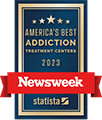At Wilmington, we provide men & women the highest level of care in a setting of complete peace. You won’t find a cold hospital environment here; rather, we ensure the comfort of all how are treated at our treatment center. You’ll have access to quiet, private spaces for individual and group therapy and welcome you to enjoy our common areas for recreation, relaxation, and fellowship.
Mornings
Patients wake up around 6:30 a.m. and make their way to our dining hall for a nutritious breakfast.
We begin the treatment day with a daily community meeting lead by our Community Counselor. At this meeting we discuss the upcoming day and celebrate patients who are completing treatment.
This is followed by an educational lecture held in the clinical building for all patients. Lectures are led by our medical director, dietician, nurses, counselors and IOP Directors and address various topics such as the disease of addiction, nutrition, aftercare and relapse prevention.
After the lecture patients break out into small process groups lead by their respective counselor.
Afternoons
After lunch patients participate in a therapy track determined by personized treatment plan as well as activities with our full-time recreational therapist who helps them learn how to have fun without using drugs or alcohol.
During breaks, patients complete 12-Step work and therapeutic assignments, write letters, play sports on our basketball and volleyball courts, or get creative through coloring or bracelet making. On a weekly basis, patients earn the ability to go on an outing.
At Wilmington Treatment Center, patients have a voice in their own recovery experience. A patient advocacy committee made up of elected patients meets with our directors once a week to discuss issues at our treatment center and make recommendations. There is also a patient advocate on site who is available to help with special needs or issues.
Evenings
Patients gather for dinner around 5:00 p.m. Meals are planned by our dietician in accordance with a healthy lifestyle and include a variety of options daily.
In the evening patient’s attend on-campus AA/NA meetings and enjoy a few minutes of quiet time before lights out at 11:00 p.m.
Groups & Meetings
Circle In/Out:
A peer lead group welcoming all new patients from the previous day and saying goodbye to all patients that are scheduled to discharge for the upcoming day.
Community Meeting:
This meeting is led by the Community Counselor. It is an opportunity for daily announcements, introduction of the Charge Nurse and new staff. We also take this opportunity to recognize the patients who have completed treatment, read daily devotion and close with the serenity prayer.
This meeting transitions directly into the morning lecture every day. Topics include but are not limited to the disease concept, the Twelve Steps, Nutrition, physical health, the family component of treatment, and outpatient services.
Process Group:
Group meeting lead by a member of your counseling team. During the group meeting time, patients are responsible for talking about what is troubling them. Discussion flows according to what patients would like to talk about — the counselors do not, for the most part, assign topics for the group to discuss. Patients are encouraged to give support and feedback to others, and to work with the reactions and responses that other patients’ contributions bring up for them. The therapist will serve as a model for effective communication, offer problem-solving strategies, and promote self-acceptance and self-support.
Gender Process:
Gender groups are held on the weekends. These groups are led by staff of the same gender in order to address the issues that are unique to men and women in early recovery.
Therapy tracts include Brain entrainment, Grief and Loss, CBT, Psych Education, Process Group, Acupuncture, Men/Women in Recovery, Healthy Boundaries, Medicine and Recovery, Continuing Care, Chronic Pain, Spirituality and Recovery, and Mindfulness.
Big Book Study:
Big Book study is an introduction to the AA Big Book and the Recovery process.







